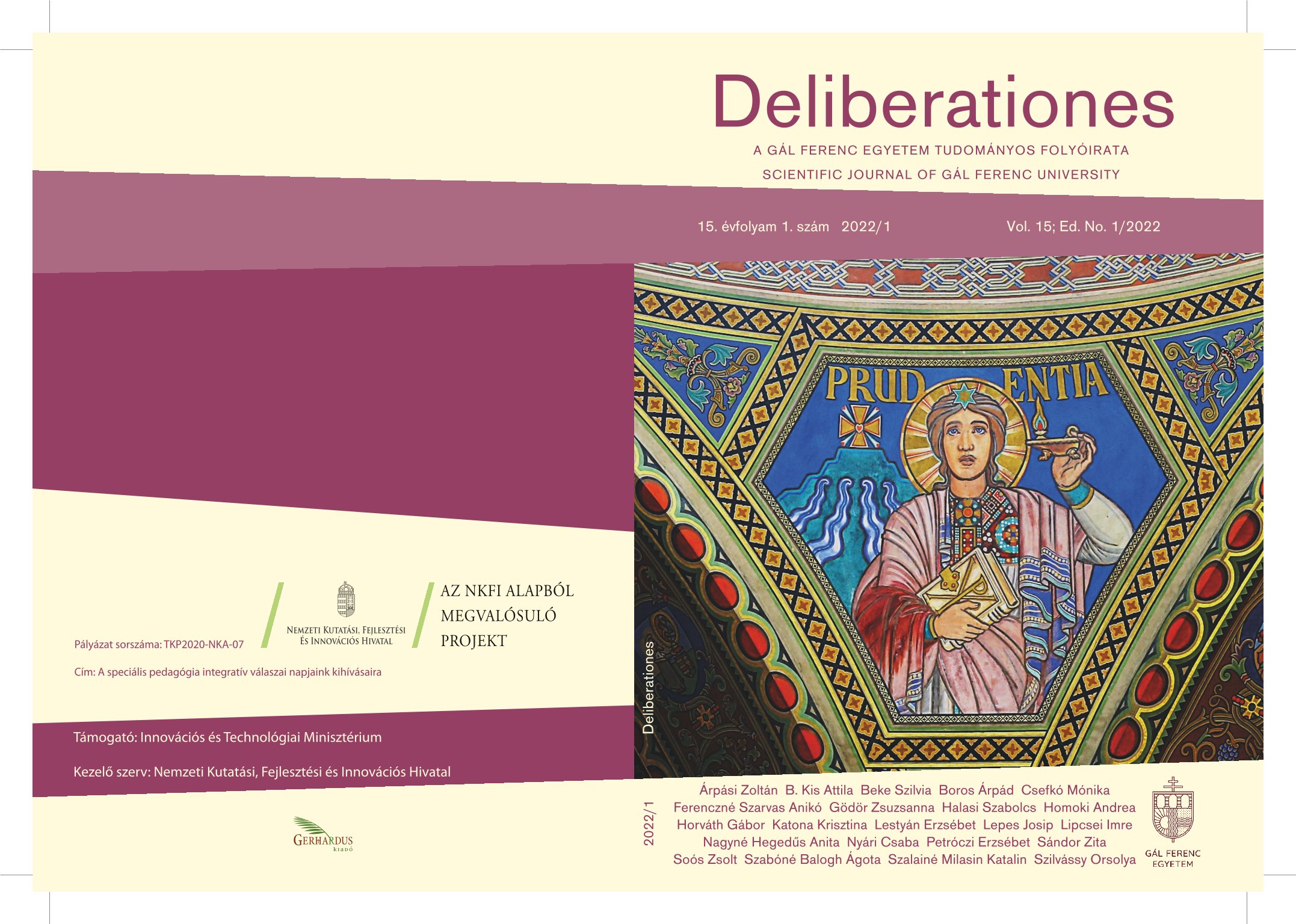Abstract
The education and training of children with special educational needs is of great importance, as a serious illness and its consequences can cause pupils to miss months of formal education. Teaching them is important not only for their progress in the daily curriculum, but also for the well-being of children with illnesses. Integrating them into school life, including through video technology, can help avoid social isolation and its negative effects.
Hospital education, as a discipline concerned with the education of sick children, provides an appropriate theoretical and practical basis for the task of educating sick children. Although the discipline has a long history of several decades both nationally and internationally, unfortunately hospital education services are still not available for many children in our country.
However, it is important to emphasise that the education of sick children is a special task for which teachers need special knowledge and skills, and it is therefore essential to establish an appropriate training programme for professionals involved in the education of sick children. Teachers need to be linked to the members of the treatment team, parents, teachers in the mother school, the classroom community and, most importantly, the student with the disease. The empathic skills of the hospital teachers are of paramount importance, enabling them to tune in to the personality of the sick child, the characteristics of the illness and its treatment, and the child’s current state of mind, and to adapt the teaching method in response to these. It is important for hospital teachers to have specific knowledge of the psychological, social and cognitive consequences of the illness, in order to be able to interpret the psychological reactions of children with the illness and to be able to report problems to the appropriate professional. They should also have specific knowledge of educational methodology adapted to the hospital environment.
References
Felhasznált irodalom
Becsei-Balogh, R., Szili, K. (2016). Kórház-pedagógia. Képzés és Gyakorlat, 14(3-4) 65-92.
Benigno, V., Fante, C. (2020). Hospital school teachers’ sense of stress and gratification: An investigation of the Italian Context. Continuity in Education, 1(1), 37–47. https://doi.org/10.5334/cie.14
Boekaerts, M., & Röder, I. (1999). Stress, coping, and adjustment in children with a chronic disease: A review of the literature. Disability and Rehabilitation: An International, Multidisciplinary Journal, 21(7), 311–337. https://doi.org/10.1080/096382899297576
Cacioppo, J. T., Hawkley, L. (2003). Social isolation and health, with an emphasis on underlying mechanisms. Perspectives in Biology and Medicine, 46(3)39-52. https://doi.org/10.1353/pbm.2003.0063
Csabai, M., Molnár, P. (2009). Orvosi pszichológia és klinikai egészségpszichológia. Medicina Kiadó.
Drotar, D. (2006). Psychological interventions in childhood chronic illness. American Psychological Association.
Homoki, A. (2014). A gyermekvédelmi gondozottak reziliencia vizsgálata a Dél-alföldi és az Északalföldi régióban. Debreceni Egyetem. http://hdl.handle.net/2437/201731
Homoki, A. (2016). A boldogulás elősegítése nehéz helyzetben lévő serdülők körében: Gyermekvédelemben élni a szeretet erejével. Áldott Remény Könyvkiadó.
Keehan, S. (2021). Continuing Education in Irish Hospital Schools: Provision for and Challenges for Teachers. Continuity in Education, 2(1), 42–59. DOI: http://doi.org/10.5334/cie.25
Lavigne, J. V., a Faier-Routman, J. (1992). Psychological adjustment to pediatric physical disorders: A metaanalytic review. Journal of Pediatric Psychology, 17, 133–157. https://doi.org/10.1093/jpepsy/17.2.133
Lemke, R. E. (2004). A hospital school: An intrinsic case study. Retrieved
Livneh, H., Antonak, R. F. (2005). Psychosocial Adaptation to Chronic Illness and Disability: A Primer for Counselors. Journal of counseling and development, 83, 12-20. https://doi.org/10.1002/j.1556-6678.2005.tb00575.x
Molnár, K. (2014). Betekintés a kórházpedagógiába. Neveléstudomány, 1. 82-96.
Newacheck, P. W., Taylor, W. R. (1992). Childhood chronic illness: Prevalence, severity, and impact. American Journal of Public Health. 82, 364-371. https://doi.org/10.2105/ajph.82.3.364
Papp, Zs., Kökönyei, Gy., Békési, A. és mtsai. (2016). Egészséggel összefüggő életminőség három gyermekkori krónikus betegségben. Alkalmazott Pszichológia. 16 (3), 79–93. https://doi.org/10.17627/ALKPSZICH.2016.3.79
Scott, K. M., Bruffaerts, R., Tsang, A., és mtsai. (2007). Depression–anxiety relationships with chronic physical conditions: Results from the World Mental Health surveys. Journal of Affective Disorders, 103,113–120. https://doi.org/10.1016/j.jad.2007.01.015.
Shiu, S.. (2001). Issues in the education of students with chronic illness. International Journal of Disability, Development and Education, 48(3), 269-281. https://doi.org/10.1080/10349120120073412
Steinke, S. M., Elam, M., Irwin, M. K., Sexton, K., & McGraw, A. (2016) Pediatric hospital school programming: An examination of educational services for students who are hospitalised. Physical Disabilities: Education and Related Services, 35(1), 28–45. https://doi.org/10.14434/pders.v35i1.20896
Susánszki, É., Szántó, Zs. (2006). Fiatalok egészsége. UISZ jelentés. http://www.ifjusagugy.hu/uszi_kotetek/UISZ-13.pdf
Uggeri, M., Capurso, M., Dennis, J., Janssen, E., Merkt, A., Schmeider, I., & Patel, D. (2015). Learning at home and in the hospital. The institutional environments of Home and Hospital Education (HHE) in Europe. Retrieved
Volentics, A. (1997). Kórházpedagógia. In: Báthory, Z. és Falus, I. (szerk.). Pedagógiai Lexikon. II. Budapest: Keraban Könyvkiadó.
Internetes források
A tartós gyógykezelés alatt álló gyermekek, tanulók köznevelési ellátásának irányelve: https://www.oktatas.hu/kozneveles/kerettantervek/2020_nat/iranyelvek_alapprogramok/tartos_gyogykezeles_szakmai_iranyelv, letöltve: 2022.11.02.
Iskola-egészségügyi jelentés: https://www.nnk.gov.hu/index.php/egeszsegugyi-igazgatasi-foosztaly/vedonoi-tevekenyseg/modszertan/1026-iskola-egeszsegugyi-jelentes letöltve 2022.11.02.
Kórházpedagógia pedagógus-szakvizsgára felkészítő szakirányú továbbképzés szakleírása: https://www.felvi.hu/felveteli/szakok_kepzesek/szakleirasok/!Szakleirasok/index.php/szak/20664/szakleiras letöltve: 2022.11.02.
Kórházpedagógia szakirányú továbbképzés szakleírás: https://www.felvi.hu/felveteli/szakok_kepzesek/szakleirasok/!Szakleirasok/index.php/szak/21458/szakleiras letöltve: 2022.11.02.
KórházSuli: https://korhazsuli.hu/, letöltve 2022.11.02.
Központi Statisztikai Hivatal, 22.1.2.6. Születéskor várható átlagos élettartam, átlagéletkor nem, megye és régió szerint: https://www.ksh.hu/stadat_files/nep/hu/nep0039.html, Letöltve: 2022.11.18.
Központi Statisztikai Hivatal, 22.1.1.9. Halálozások száma és aránya, csecsemőhalandóság, születéskor várható élettartam, halálozás főbb okok szerint: https://www.ksh.hu/stadat_files/nep/hu/nep0009.html, Letöltve: 2022.11.18.
Jogszabályi hivatkozások
Nemzeti köznevelésről szóló 2011. évi CXC. törvény
A pedagógiai szakszolgálati intézmények működéséről szóló 15/2013. (II. 26.) EMMI rendelet
